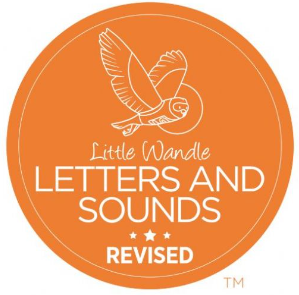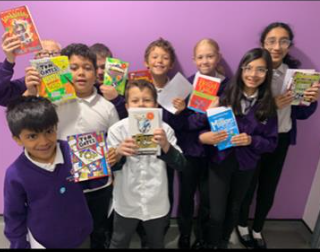Reading
Intent
We aim to provide a reading rich curriculum that introduces our children to a range of quality and diverse texts that reflect our society, our community and our children. Using a range of classic and modern texts, we strive to develop a reading for pleasure culture that excites and engages children with reading, both in and out of the classroom. Books drive our English teaching and learning, where texts are chosen to match both our curriculum needs and our themes and topics.
Implementation: 
Phonics
Following a rigour and progressive synthetic phonics programme is a necessary requirement for all children in Year 1 and below. At Nottingham Academy, all our staff, regardless of Year group, are trained to deliver the Little Wandle phonics scheme, which is a government accredited phonics programme.
Children in EYFS and Years 1 and 2 receive daily phonics teaching, plus ‘keep up’ sessions and interventions if need is recognised, to ensure that all children are being given the opportunity to progress. Both the teaching and the keep up sessions are based on regular assessments that inform staff the phonic stage that each child is on, whilst allowing any gaps in knowledge to be quickly noticed and rectified.
Children in Years 3- 6 who are not yet phonetically secure also receive individual or small group phonics instruction, which from the use of regular and rigorous assessments, are carefully matched to meet their phonic need.
Guided reading
All children within school have regular guided reading sessions. Through group reading and reading tasks in EYFS all children explore books and reading in different contexts in a heavily supported way.
In Year F2 and Year 1, the children follow the Little Wandle weekly reading programme using Little Wandle Big Cats books. These sessions are based on decoding, prosody, fluency and comprehension.

In Year 2 and above, whole-class discussion and shared reading activities focus on high quality modelling and book talk. These guided lessons provide a deeper understanding of what characters are thinking, how they are feeling and why they act the way they do, as well as exploring authorial choices in terms of vocabulary, intent and sentence structure.
Through careful questioning, children learn how stories and non-fiction writing is constructed and in doing so, develop their comprehension skills and their ability to better understand and interpret the books they read.
Reading Books
All children have reading books which are carefully matched to either their phonic or, once phonetically confident, fluency and comprehension level. In order to do this, we use a range of assessments, based upon our book banding system, National Curriculum and end of Key stage standards as well as reading speed and other teacher assessments. Children are encouraged to read regularly at home and within school in addition to guided reading sessions. Some children will read 1-1 with an adult more frequently, depending on need, age, and stage. These 1-1 reading times are really special as they allow for book talk as well as skills development at a very personal level.
Reading for pleasure
Reading is fundamental to everything we do, not just as part of our English curriculum. We are aware of the impact it has on the development of children in all subjects as well as the cultural capital it can add to their lives.
Class books, which are shared at story times, are chosen and mapped across the year groups to give our children exposure to a wide range of texts and authors.
Each class has a book area or library to promote and celebrate reading at all times. Year groups have central library areas and a whole school curriculum zones are fantastic spaces where children can immerse themselves in non-fiction texts linked to their favourite curriculum areas. Books are borrowed from curriculum zones to use in classrooms to support lessons.
Initiatives and incentives are designed to further promote reading for pleasure, including the opportunity to attend a reading café or taking home one book to keep.
Our whole school reading incentive challenge provides children with the opportunity to earn points for showing good reading behaviours, such as:
- Bringing your book bag to school every day
- Participating in class reading times, not just in guided reading but across all areas of the curriculum
- Reading at home
- Taking care of our school libraries
- Making book recommendations
- Doing additional reading around current topics across the curriculum
- Trying hard to hit reading targets


We also have links with our local library, and we endeavour to ensure that all children at the school have library cards.
